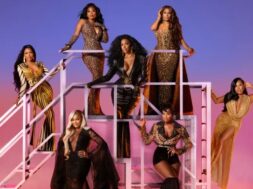Kendrick Lamar vs. Drake: The Griot and the Hitmaker
By Edrea Davis – As someone who remembers the birth of hip-hop when my neighbors in New Jersey dropped Rapper’s Delight and made history, I’ve had a front-row seat to the genre’s evolution. Fast-forward to today and I’m reflecting on two of hip-hop’s most influential artists: Kendrick Lamar and Drake. Both deserve respect, but for very different reasons. Kendrick epitomizes the heart of hip-hop—a oral and visual storyteller, a griot, a voice for the community. Drake, on the other hand, has mastered the art of commercial success in the business of hip-hop, crafting hit songs that dominate charts and visuals that etch into memory. It’s like comparing Run-DMC to the Beastie Boys in 1986: cultural pioneer vs a commercial crossover.
I have to admit, Drake’s latest move has me shaking my head. Suing his record label over Kendrick’s diss track Not Like Us is professional malpractice for a hip-hop artist. Everyone I know, from teenagers to retirees, has been blasting Not Like Us in cars, bars and at family barbecues. The lawsuit feels like a spoiled brat move (old-school definition), especially since Drake was fully engaged in their feud until Kendrick dropped the mic and put a decisive end to the ongoing feud.
What’s even worse, suing over a diss track getting too much play is contrary to hip-hop’s competitive spirit. That’s not how the culture works. It’s hard not to think of Kendrick’s bars, “you’re not a colleague, you’re a colonizer,” and wonder if Drake’s move confirms Kendrick’s point. Drake’s actions echo what we see too often—people who see themselves as superior refusing to accept defeat and using the system to fight losing battles instead of stepping up their own game. It’s reminiscent of broader issues in American politics, like the fights over affirmative action, DEI policies, or even an insurrection—efforts to blame others for their failures instead of addressing their own shortcomings.
“What’s even worse, suing over a diss track’s popularity goes against hip-hop’s competitive spirit. That’s not how the culture works. Kendrick’s bars, ‘you’re not a colleague, you’re a colonizer,’ come to mind, making you wonder if Drake’s move is proof of just that. His actions mirror what we’ve seen too often—people refusing to accept defeat, using the system to fight losing battles instead of stepping up their game. It’s reminiscent of broader issues in American politics, like the fights over affirmative action, DEI policies, or even an insurrection—efforts to blame others for their failures instead of addressing their own shortcomings.”
While Drake is filing lawsuits, Kendrick is busy making history since he knows Not Like Us annihilated his opponent. There’s not better way to solidify his standing in hip-hop than for the Compton, CA native’s sixth album, GNX, to dominate Billboard’s Top 10 with seven tracks: Squabble Up, TV Off, Luther, Wacced Out Murals, Hey Now, Reincarnated, and Man at the Garden.
That’s not just chart success—it’s a statement. Kendrick isn’t just a rapper; he’s the griot of his generation. Like the African storytellers who carried our history through the horrors of slavery, he’s continuing hip-hop’s legacy as a cultural guardian , telling stories that matter and preserving the voices of the community.
Drake, for all his chart-topping success and undeniable talent, feels like the ultimate performer—a man who delivers hit after hit, but without the same cultural anchoring. I’m sure he has a unique story to tell, but his stories often feel like polished projections of other people’s stories with flawless execution, but lacking authenticity.
This isn’t to diminish Drake’s contributions. His skill and commercial impact have changed the game, and his music resonates with millions. But when it comes to defining the culture, to being a voice that speaks for and to the people, it’s Kendrick— his bars cut deep, his storytelling is unmatched, and his influence resonates far beyond sales numbers.
Hip-hop has come a long way since the days when enslaved griots told stories of their freedom back in Africa, and since the Sugar Hill Gang made history with the first rap song on wax, Rapper’s Delight. What started as a voice for the voiceless has grown, evolved, and become a global phenomenon. But one thing hasn’t changed: game recognizes game. Drake will continue to make good music for now; but for longevity’s sake he might want to stop chasing lawsuits and focus on making music that tells his unique story. Kendrick Lamar stands as a reminder that authenticity, activism and artistry will always reign supreme. Kendrick has carved out a space in hip-hop royalty, building a legacy that’s untouchable and timeless.









